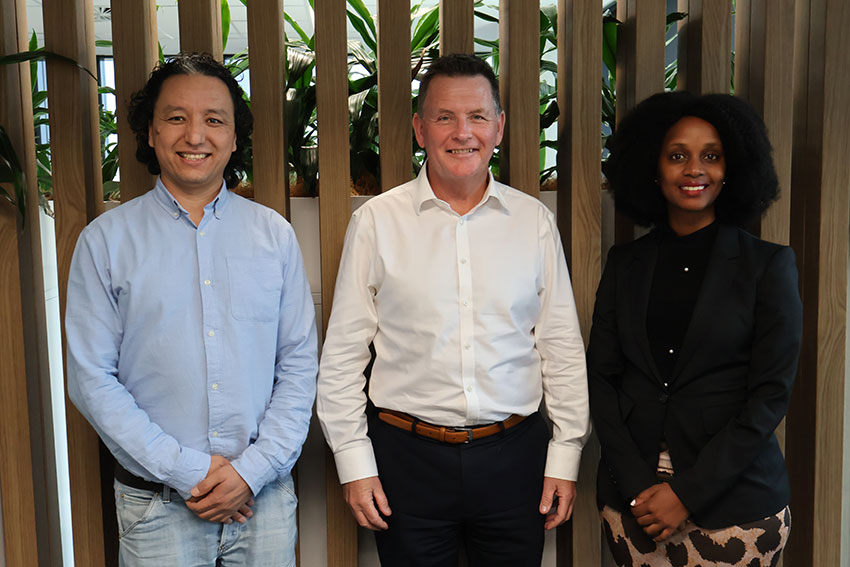“There are many benefits people with refugee or asylum-seeking backgrounds can bring to the workforce,” says Hannah O’Brien, Principal Organisational Capability Advisor at CS Energy.
“There’s a lot to be learned from people with different life experiences, perspectives and ways of thinking.”
Jawed Sarwary and Delou Uwayo commenced internships with CS Energy in late 2023 via CareerSeekers, which assists Australia’s humanitarian entrants into new careers.

Jawed Sarwary (left) and Delou Uwayo (right) with CS Energy CEO Darren Busine.
“Even though we go to university here, and are getting our degrees, the chances to get a job are slim due to things like lack of local professional experience, our unusual names, and accents,” said Jawed, who is originally from Afghanistan and studying a Bachelor of Economics at the University of Queensland.
“All these things pile up against us when we’re trying to secure a job after graduation, so CareerSeekers helps us find opportunities with companies like CS Energy so that we can build up our professional experience and CVs, and increase our chances of getting job interviews.”
Delou, who is from Burundi, is in her final year of studying a Bachelor of Law at the Queensland University of Technology. She is interning with CS Energy’s legal team.
“Working in this kind of environment, and around the people in these jobs, it lets us see how they work professionally and to help us understand how to do things, and how our studies connect to the real world,” she said.
Benefits flow both ways
While the benefits of work experience for students are generally understood, the benefits that refugees can bring to a workplace are less considered.
“Coming from a different culture, having a different lived experience and different mindset also brings different sets of critical thinking – we can see alternatives,” said Jawed, who already holds a political science degree and previously worked with the UN and U.S. Embassy.
“Just by virtue of not being born here, and how we came to be here, we are aware of international affairs and have connections in other countries that may be going through conflict,” Jawed said.
“It gives us an understanding of how that can impact things in Australia, like supply chain issues and energy prices.”
Delou speaks four languages – English, French, Swahili and Kirundi – which she says helps her to better communicate and collaborate with colleagues from different backgrounds and cultures.
“It can also help resolve conflicts and mediating disputes,” she said.
“And my background has helped me better prepare to adapt to both unforeseen challenges and opportunities,” said Delou.
“We are always looking at continuous improvement,” said Jawed. “We are often forced out of our home country and have to find something somewhere else.
“That makes us resilient, and when organisations come under pressure, we have this resilience we have from lived experience, and we will not give up quickly; and that attitude can help those around us, too.”
Both Jawed and Delou said they are grateful for the opportunity their internships have brought them.
“This experience has made us feel seen, welcomed, included, valued, and appreciated,” said Delou.
“The support and friendship we have built here is enormous.”
“I’ve been working on data and contract analytics for Procurement, and am also getting some exposure to energy trading and analytics,” said Jawed. “I’ve learned about modelling and predictions in my degree, and can’t believe I get to experience this as part of my internship.”